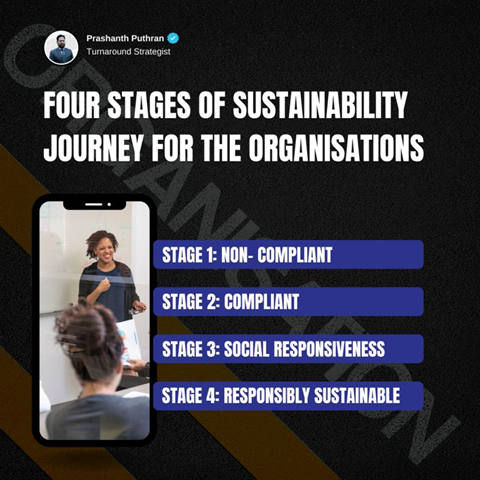
Prashanth
- 0
- 36
The four stages of Sustainability Journey for the organisations
Stage 1: Non- compliant
Occurs when an organisation has little awareness about sustainability and is forced by government and/or humanitarian organisations (NGO, UN, etc.) to comply with environmental regulations and laws.
Once rectified the behaviours and practices of these organisations can be classified as compliant.
Stage 2: Compliant
While technically compliant, in this stage it is still difficult to think of these organisations as sustainable businesses.
Their main objective is to avoid any potential fines or additional tax.
Accomplishing the minimum legal requirements in terms of environment and society is the focus of their HRM.
These first two stages can also be defined as “social obligations” that any organisation has to fulfil.
Stage 3: Social responsiveness
In this stage, organisations go beyond compliance and start to acknowledge that they wish to care for the environment and the people living in it.
They may adjust their mission statement to include such a statement.
This stage represents an organisation’s willingness to go one step further and get involved with local communities, health and the surrounding environment.
However, this desire is still linked to the opportunistic concept of the business case to sustainability through increasing the organisation’s profit.
Quite often, the reason for being socially responsive is to improve their own reputation and brand value.
HR practices and the organisation’s social actions are guided by the social norms and needs of the organisation.
Stage 4: Responsibly sustainable
At this level sustainability is fully integrated into the corporate strategy.
All HRM practices are focused on managing for a sustainable future, always acting in ways that are good for society.
A long-term focus and an ethical imperative to do things that make society better are what shape the corporate strategy and its HRM practices.
This stage integrates an organisation’s human and social capital and seeks to have a positive influence on industry, policy and society.
#sustainabilityperformance #sustainabilityleadership #peoplemakethedifference #futureleaders
